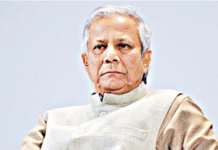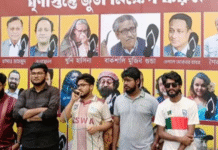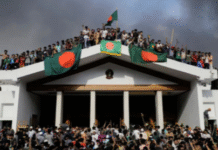
War crimes accused Jamaat-e-Islami ameer Motiur Rahman Nizami had been captured from his house by the freedom fighters at end August during the 1971 Liberation War, said the investigation officer on the closing day of cross-examination before the International Crimes Tribunal-1 on Monday.
“During investigation, I had collected the information through interrogating prosecution witnesses living in Sathia, Pabna,” said IO ASP Abdur Razzaq Khan, the last prosecution witness (PW-26).
Nizami, then president of Islami Chhatra Sangha (ICS), a student wing of Jamaat-e-Islami, had also been beaten during captivity in a boat for some days, he added.
Replying to a defence question, the IO told the three-member tribunal, headed by Justice ATM Fazle Kabir, that during investigation he did not get any information against Nizami carrying out physical torture on any captured person at their makeshift camp at Nakhalpara MP Hostel in the capital. “And I didn’t submit any such report to the prosecution.”
Referring to the statements made by the PWs, the IO, however, said Nizami had used abusive language against the captives.
Replying to another defence question, IO Razzaq said during investigation he could not collect any documentary evidence or news published in newspapers as to whether Nizami had met with Pakistan President Gen Yahya Khan or any occupation army officer during the 1971 Liberation War.
“I also could not collect any documentary evidence or newspaper reports whether during the Liberation War Nizami exercising his power had ordered the occupation army or its auxiliary forces to carry out any operation or stop it or punish any of his subordinates,” said the IO.
He also admitted that there was no such information in the police secret fortnightly report or anything in the newspapers about Nizami appearing in Pabna and conducting operation through the occupation army or its auxiliary forces.
The IO replied in the negative when asked whether he submitted the investigation report to the prosecution accusing Nizami under subsections 4(1) and 4(2) (liability for crimes) of the International Crimes (Tribunals) Act 1973,
“The formal charge against Nizami was not submitted before the tribunal in consultation with me,” he said.
IO Razzaq told the tribunal that he had recorded the statements made by the prosecution witnesses with honesty and sincerity.
Denying defence suggestions, the IO said: “It’s not true that accused Nizami had become a victim of the incumbent government’s political vengeance since he holds the position of ameer of Jamaat-e-Islami.”
“It’s also not true that during the Liberation War accused Nizami was not involved in any crimes against humanity and he had played only a political role.” he said.
At long last, defence counsel Mizanuil Islam concluded the cross- examination of the IO exhausting seven days.
A former minister during the past BNP-Jamaat rule, Nizami is being tried on charges of involvement in murders and torture of unarmed people along with hatching conspiracy, planning, incitement and complicity to commit genocide and crimes against humanity during the 1971 Liberation War in collaboration with the Pakistan occupation army.
Also the president of Islami Chhatra Sangha (ICS), the student wing of Jamaat-e-Islami in 1971, Nizami faces 16 counts of charges based on 16 separate incidents of crimes against humanity, in which at least 600 unarmed people were killed and 31 women raped during the Liberation War.
On May 28, 2012, the tribunal indicted the Jamaat ameer for committing the 1971 crimes against humanity.
On June 29, 2010, Nizami was arrested in front of the National Press Club after a magistrate court in Dhaka issued warrant of arrest in connection with a criminal case over hurting religious sentiment of Muslims. Later he was shown arrested in connection with the war crimes case.
Source: UNB Connect









